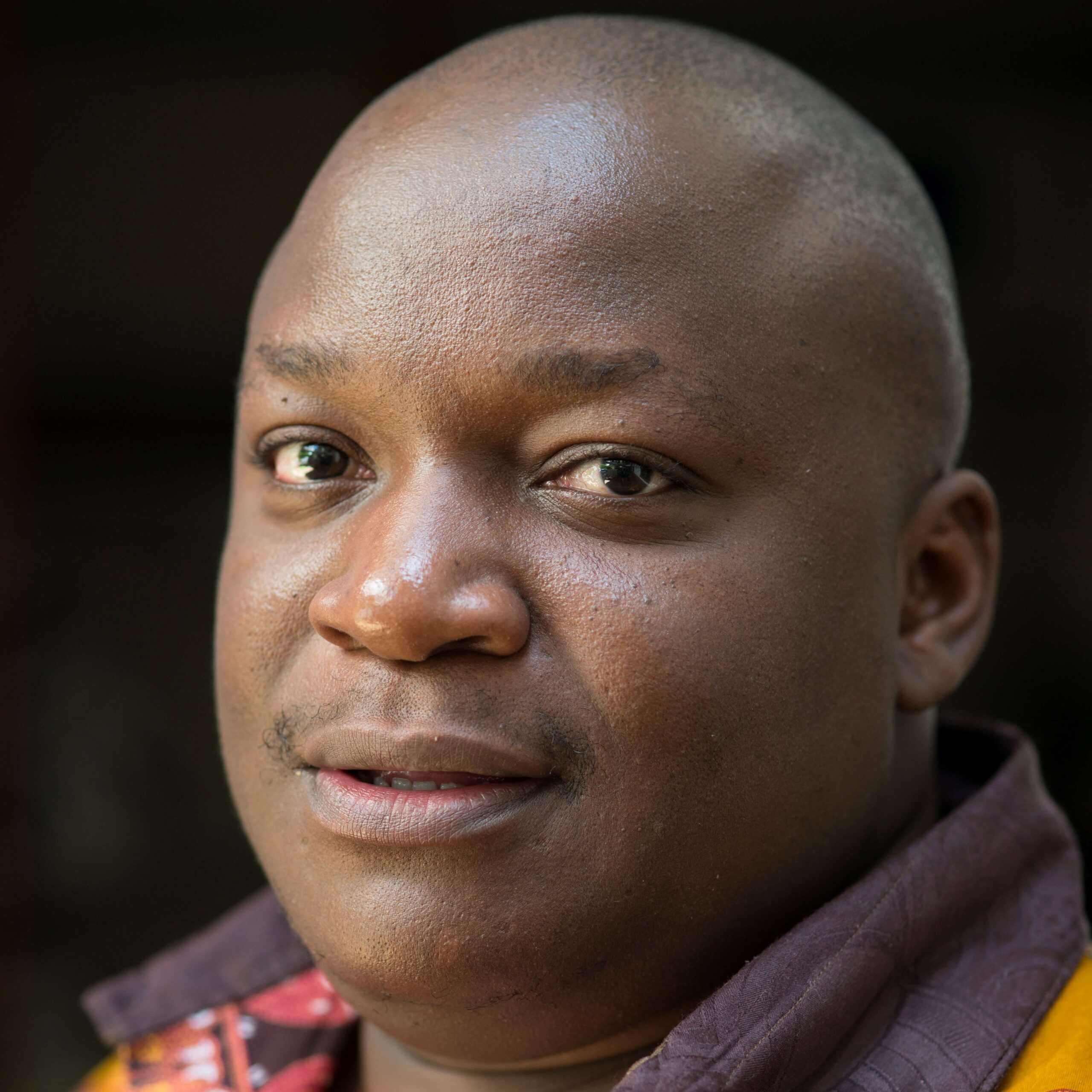The Entrepreneur
Dignified Work for Disabled Kenyans
Verifiably Fredrick Ouko is living proof that self-less determination can impact positively to a society

Social enterprise Riziki Source promotes professional development for one of Kenya’s most disadvantaged communities.
.
By Charles Wachira
At just 2 years of age, Fredrick Ouko contracted polio. The disease left both of his legs permanently paralyzed, but it also left him determined to ensure that people with disabilities get equal opportunities.Today, Ouko now forty identifies with the 2.2% of his countrymen and women living with some form of disability.
“I have known nothing else save for my physical disability. And that is why I clearly understand the potential my kind possesses,” Ouko stated, adding that “routinely they are denied employment opportunities because of their disability,” the founder and director of Riziki Source revealed.
Riziki Source is a Kenyan social enterprise that leverages technology to connect persons with disabilities with job opportunities.
The initiative was born in 2016 out of the frustrations and challenges Ouko faced while job searching after completing his undergraduate studies.
“Getting around Nairobi while dropping my resume to potential employers was an uphill task. There were many rejections, which included being hounded out of offices by guards who believed people with disabilities should only beg for handouts. But my goal was finding employment,” said Ouko.
Determined to create a solution, Ouko began developing an online platform to match job seekers with employers. He named it Riziki Source, using the Swahili word for “livelihood”.
Through the organization’s website, users are able to input their qualifications, skillset, location, and disability and are then matched with potential employers. Users’ qualifications and skillsets are visible to businesses but not their CVs. Should an employer express interest in a specific candidate, they connect with Ouko and his colleagues at Riziki Source.
The enterprise has also developed a mobile app that helps people with disabilities find job opportunities locally.
In addition, the app also provides users with information on employers that are committed to hiring people with disabilities, as well as information on accessible transportation options and other resources that can help them to secure employment.
“We usually post syndicated job opportunities from other platforms, or employers send us job opportunities directly, which are then posted internally. Thus all registered members on the database have access to these vacancies, and they can apply directly or request help to apply since we don’t conduct interviews ourselves,” said Ouko.
A report released in 2020 by the Public Service Commission in Kenya showed that only 1% of employers had disabilities – way below the constitutional threshold of 5%.
The report further showed that denying equal employment opportunities to disabled persons singularly contributes to the poverty afflicting the group.
Statistics paint a dire picture of people with disabilities or PWD’s in the Kenyan workplace. But there are rays of hope and Ouko’s startup is a shining example.
Stella Mwangi, 25, was involved in a car accident that left her paralyzed 5 years ago, since then, she always uses a wheelchair for mobility.
“From my experience, the Riziki resource platform is handy because of bridging the gap between PWDs and a lack of employment. They are the connection between employers and us,” says Mwangi, who was assisted in getting a job at a telecommunications firm, by the social platform.
She is now the Personal Assistant to both the Network and IT directors and the Human Resources Administrator for both departments at the firm, where she supports 55 employees.
“I heard about Riziki Resource from a WhatsApp group where the members are PWDs. The firm has been of tremendous assistance to me and other PWDs because of their major efforts to push for the employment of people from our community,” she said.
The enterprise also trains and advises employers on measures that need to be implemented to make the environment conducive for physically challenged people, according to Mwangi.
James Obonyo, now 31, suffered a spinal cord injury while in school.
“I was referred to Riziki Resource by a friend, and I later researched more about them on the Internet. Riziki provided guidance on having a professional resume and interview skills in preparation for the job applications,” Obonyo said.
Today, he’s a financial analyst at the Capital Markets Authority, the statutory body regulating capital markets within East Africa’s largest economy.
“Riziki Resource is an ingenious idea that solved the fundamental issue of moving around in search of a job, bearing in mind mobility is a challenge,” added Obonyo.
Ouko bankrolled Riziki Resource with his savings and despite several global awards – including the Innovate Now Disability Employment Award in 2022, which came with a cash award of £15,000 – he has yet to break even. However, he remains hopeful that the organization will be able to capitalize on the exposure it has received and grow across the region.
In 2018, the organization was shortlisted for the African Engineering Prize, and in March this year, the organization won the Now-Us! Awards. The award honors inclusive initiatives from Africa and Asia that empower otherwise excluded groups.
“In five years to come, we see ourselves as the go-to experts on matters of employment for persons with disabilities in Kenya and the region. We will be looking at employment from a 360 lens. We want to stand out as a dependable brand on matters of employment for persons with disabilities,” Ouko said.
The Entrepreneur
Miss Rwanda 2022, Divine Muheto, Faces Drink-Driving Scandal

: Miss Rwanda 2022, Divine Muheto, was arrested for drink-driving, fined, and
detained after a car crash. She expresses regret and seeks forgiveness for her
actions.
From Beauty Queen to Legal Controversy
Divine Muheto, 21, crowned Miss Rwanda 2022, rose to prominence as a symbol of
beauty and ambition. She always believed she had what it took to achieve her childhood
dream of becoming a beauty queen.
Her journey began after high school when she entered the Miss Rwanda competition,
ultimately claiming the coveted title.
Reflecting on her success, she once said, “When you fear, you can’t make anything
different in life, but when you are fearless, a lot of positive things come your way.”
Legal Troubles in 2024
However, her reign as Miss Rwanda has been overshadowed by controversy. In late
2024, Muheto was arrested following a drink-driving incident in Kigali.

Reports from the Rwanda National Police (RNP) confirmed that she was caught driving
under the influence of alcohol without a valid license, resulting in a crash that destroyed
public infrastructure, including a street light pole and palm trees.
The police also noted that Muheto fled the scene of the accident. She was subsequently
fined 190,000 Rwandan francs (approximately $140) and detained.
This incident marked a troubling pattern, as the beauty queen had previously faced
similar charges in September 2023, when she crashed her car into a building while
driving drunk.
Silent Remorse and Public Engagement
Muheto, the daughter of Assistant Commissioner of Police Francis Muheto, has
remained largely silent in the media following her arrest, though her legal team has
expressed that she deeply regrets her actions and has sought forgiveness.
Despite this, she continues to be a public figure, engaged in various activities. Her legal troubleshave raised concerns, but she remains resolute in her belief that life’s challenges present growth opportunities.

Inspirational Messages and Support System
While her parents have largely stayed out of the spotlight, Divine Muheto has continued
to inspire many young people in Rwanda, emphasising resilience and self-improvement.
She once said, “I knew I had what it takes to the last dot,” and even in the face of
adversity, she strives to move forward, learning from her mistakes and striving to make
a positive impact.
She Business
How Margaret Nyamumbo Built Kahawa 1893 from the Ground Up

: Discover Margaret Nyamumbo’s journey from Kenya to the U.S. and how she
built Kahawa 1893 to empower women coffee farmers, achieving business
success and social impact
Early Life and Education: Pursuing Global Opportunities
Margaret Nyamumbo’s entrepreneurial journey began in Kenya, where she grew up on a coffee
farm. However, she moved to the U.S., a decision that significantly shaped her path.
In 2000, she travelled to Smith College, a prestigious liberal arts institution in Massachusetts,
to study economics.
Her desire to study abroad stemmed from the limited educational opportunities available for
women in Kenya at the time. As she later explained, her family encouraged her decision, viewing it as a way to give her the best opportunities for success.

After earning her degree from Smith College, Nyamumbo pursued an MBA at the Wharton
School of the University of Pennsylvania, known for its rigorous business programs.
This solidified her foundation for a future in business, although it was the allure of her roots and a passion for coffee that eventually led her back to entrepreneurship.
From Corporate Work to Entrepreneurship: Embracing Coffee Culture
After completing her studies, Nyamumbo worked in investment banking and consulting, but the world of corporate finance didn’t fully satisfy her ambitions.
It was her return to the coffee industry, deeply connected to her Kenyan heritage, that drove
her entrepreneurial leap. With a vision to support East African coffee farmers, particularly women, Nyamumbo founded Kahawa 1893 in 2018, a coffee brand dedicated to highlighting Kenya’s coffee culture while mpowering local farmers.
The name “Kahawa” is the Swahili word for coffee, while “1893” marks the year when coffee
was first commercially grown in Kenya, grounding her brand in historical significance.
Through Kahawa 1893, Nyamumbo aimed to bring a new approach to the coffee business, one
that not only celebrated East African coffee but also created fair wages for farmers.
Building a Brand with Purpose: Empowering Farmers
Nyamumbo’s vision for Kahawa 1893 went beyond just selling coffee.
She wanted to create a direct impact on the lives of the farmers growing the coffee beans.
The brand’s model incorporated a system where customers could tip the farmers directly via a
QR code found on the coffee bags.
This innovation set the company apart from competitors and positioned it as a socially
responsible business that directly benefited those involved in the production process.
In 2021, Kahawa 1893 hit a major milestone, getting its coffee stocked in Trader Joe’s—the
first Black- and woman-owned coffee brand to be featured there.
This breakthrough moment was significant for Nyamumbo, marking the recognition of her hard work and her commitment to uplifting local farmers.
Overcoming Challenges: What It Takes to Succeed
Despite the challenges of entering a highly competitive market, Nyamumbo’s determination
never wavered. In a 2022 interview with Forbes, she shared her thoughts on what it takes to be a successful entrepreneur.
“You have to be able to take the punches and keep moving,” she said. Her advice reflects the
reality of entrepreneurship: persistence, resilience, and a willingness to learn from failure are
crucial for success.
Nyamumbo also emphasised the importance of passion. “You’ve got to love what you do, or you won’t have the energy to push through the tough times,” she said.
These values have guided her journey, driving Kahawa 1893 to not only succeed but also to
change the way the coffee industry operates, particularly about fair trade and community
empowerment.
The Future of Kahawa 1893: Expanding Horizons
With her success on platforms like Shark Tank and continued global distribution, Nyamumbo’s
Kahawa 1893 is poised for growth.

Her brand continues to expand its reach, and the emphasis on ethical sourcing, community
impact, and high-quality coffee will likely remain at the heart of her business model as she looks to further innovate in the global coffee market.
Through Kahawa 1893, Nyamumbo has shown that business success is not just about
profits—it’s about purpose, people, and passion.
The Entrepreneur
Paul Mburu Muthumbi: Building Kenya’s Mbukinya Bus Empire
Mbukinya faced tough early challenges: stiff competition, unreliable drivers, and high operating costs. Fuel price hikes and maintenance expenses cut into profits, and banks hesitated to fund small, high-risk PSV businesses. ‘There were days I doubted my choice,’ Paul Mburu recalls, ‘but I believed hard work would pay off.’”

Born and raised in Limuru, Kiambu County, Paul Mburu Muthumbi, now 90, has lived a life that exemplifies resilience and determination.
His story is not just one of personal triumph, but also a testament to the power of persistence in the face of adversity.
As a young man, Paul was passionate about the public transport sector, inspired by the buses that passed through his village. “I always knew I wanted to be involved in transport. I just didn’t know how,” he says.
In 1952, after completing his final exams, Paul found himself navigating the difficult job market.
In 1992, armed with little more than determination, Paul began hawking eggs in Nairobi’s busy streets, trying to make ends meet. “I knew that if I worked hard and kept my eyes open for opportunities, I could eventually do better,” he recalls.
It was in these early years of struggling in the informal sector that Paul learned crucial lessons about customer service, managing a small business, and the importance of reinvestment. “I used every penny from selling eggs to save for the next big step,” Paul explains.
Adding, “It wasn’t easy, but I knew that if I worked hard and kept my eyes open for opportunities, I could do better,” he recalls. Over the next 11 years, Paul saved KSh 6,000, which he used to invest in his first bus—a second-hand vehicle that would mark the beginning of his journey in the public transport sector.
The Birth of Mbukinya in 2000
In 2000, after nearly a decade of honing his entrepreneurial skills, Paul saw a potential opportunity in the public transport sector.
Nairobi, the capital city of Kenya, had a growing population, and reliable transportation services were in short supply. Recognizing the gap, he decided to take a bold leap and venture into the PSV industry.
With a small loan from a local microfinance bank, Paul bought his first second-hand bus.
The vehicle cost him KSh 800,000, an amount he managed to secure through a personal guarantee and a strong relationship with the local bank. “I didn’t have much collateral, but my reputation from my small egg business helped me convince the bank to lend me the money,” he says.
Paul registered Mbukinya, a name inspired by his family, and launched the business with a single bus operating on one route in Nairobi.
The early days were tough, with the bus struggling to fill seats and competition from well-established PSV companies. “The first few months were the hardest,” Paul admits.
“The industry was full of players, and many were set in their ways. But I believed in offering better service, and that’s how we started to build our reputation.”
Overcoming Early Challenges
The road ahead was fraught with challenges.
Mbukinya’s initial struggles included fierce competition, unreliable drivers, and high operational costs.
Paul recalls how fuel price fluctuations and maintenance costs often ate into the company’s meagre profits. “There were days when I wondered if I’d made the right choice. But I knew that with consistency and hard work, we could turn things around,” he says.
One of the biggest hurdles Paul faced was a lack of financing to expand his fleet.
In Kenya, many banks are reluctant to lend to new and small businesses, especially in the transport sector, which is viewed as high-risk.
“It was hard to get financial support from banks. They didn’t see the potential in PSV businesses back then,” Paul explains.
However, through persistence, he managed to secure another loan in 2003 from a local bank, this time amounting to KSh 1.5 million (US $.11,27.91).With this loan, he expanded his fleet to three buses.
“The key was to prove that I could repay the loans,” he says. “I made sure that Mbukinya’s buses were always well-maintained and on time. Punctuality became our trademark.”
Building a Reputation and Expanding the Fleet
By 2005, Mbukinya began to gain traction. Paul focused on customer satisfaction, ensuring his buses were clean, his drivers were professional, and the schedules were strictly adhered to.
“A happy passenger is a loyal passenger,” Paul reflects.
This commitment to service quickly paid off, and soon, the buses were consistently full, with more customers opting for his service over competitors.
To further build the company’s reputation, Paul expanded Mbukinya’s services to other major towns in Kenya.
By 2010, the company had expanded its fleet to 10 buses.
He used the profits from his expanding fleet to invest in modernising the buses, replacing older vehicles with newer, more fuel-efficient models. This move helped reduce operational costs, making the business more profitable.
In 2012, Mbukinya hit another milestone when it became one of the first PSV companies in Kenya to introduce an electronic payment system, allowing passengers to pay via mobile money platforms like M-Pesa.
This tech-forward move attracted a new generation of commuters who valued convenience.
Navigating Economic Turmoil and the Role of Banks
As with any business, the road wasn’t always smooth.
In 2015, Kenya’s PSV industry underwent a major regulatory shift. The government introduced new licensing and inspection requirements, which required operators like Paul to invest in fleet upgrades and adhere to stricter safety standards.
“It was a tough time for all of us in the industry,” Paul recalls. “The new regulations meant significant investments in safety equipment and training. But I saw this as an opportunity to differentiate Mbukinya from other operators.”
Despite the financial strain, Paul’s good relationship with banks helped him secure the necessary funding to meet the new regulations.
“The banks saw that we were committed to the business and to complying with regulations. They helped us get through those challenging times,” he says.
In 2018, Paul was able to secure a larger loan to purchase 15 more buses, growing the fleet to over 30 vehicles. His strong ties with financial institutions, built on years of consistent business practices, allowed him to access capital that many of his competitors struggled to obtain.
A Crisis with the Hino Kenya Buses
Despite the steady growth and success, Mbukinya faced a significant setback in 2019. The company had acquired 41 Toyota Hino buses, which had initially seemed like a smart investment.
However, soon after their acquisition, the buses developed severe mechanical problems, causing a major disruption in Mbukinya’s operations. The buses, which were still within their warranty period, posed a serious challenge to the company.
To address the issue, Mbukinya returned the buses to Toyota, who assumed ownership and took on the responsibility of repairing them.
According to Muthumbi, he received KSh 60 million for the buses, but he emphasised that this amount did not fully cover the massive losses the company incurred.
“I had invested billions into those buses, and the repairs took a toll on our finances. It was a huge setback,” Paul explains.
The incident was particularly painful for Mbukinya, as the company had put significant faith in the vehicles, which were expected to bolster the fleet and improve operational efficiency.
The crisis put a strain on Mbukinya’s reputation and finances, requiring both tactical responses and long-term strategy changes.
The Night Ban Controversy
In addition to the challenges with the buses, Paul Mburu Muthumbi also found himself at odds with the National Transport and Safety Authority (NTSA) over the controversial night travel ban.
In December 2013, NTSA introduced a policy restricting public service vehicles from operating between 10 pm and 5 am, citing safety concerns due to accidents during late-night travels.
This decision was met with resistance from several PSV operators, including Muthumbi, who felt that the ban was unfairly detrimental to his business.
“The night ban hit our income hard. Losing those nighttime routes meant a significant drop in revenue,” he explains.
As the chairman of the Kenya Country Bus Owners’ Association (KCBOA), Muthumbi was a vocal critic of the policy.
He even threatened to take legal action to have the ban nullified, arguing that it unfairly affected many small PSV operators who relied on night services to stay competitive.
“We’re being punished for an issue that isn’t fully in our control,” Paul said at the time. “We’ll fight this ban in court if necessary, as it directly threatens our livelihoods.”
These challenges were particularly daunting, but they didn’t deter Muthumbi. Instead, he continued to press forward, proving his resilience in the face of adversity.
His ability to navigate these difficult situations further solidified his reputation as a determined entrepreneur in Kenya’s highly competitive transport sector.
Giving Back and the Road Ahead
Today, Mbukinya operates a fleet of 50 buses, covering multiple routes across Kenya and employing over 200 people.
Paul’s story is a testament to his resilience and vision. Beyond business, he has given back to his community, sponsoring educational programs and offering employment to many young Kenyans.
“I’ve always believed that success isn’t just about making money; it’s about lifting others along the way,” says Paul, who has invested in training programs for his staff and offered financial support to local schools.
Looking to the future, Paul is planning further expansions, with a focus on sustainability.
“I want Mbukinya to be a company that not only leads in transport but also sets the standard for environmental responsibility. We’re looking into green technologies like electric buses in the next five years,” he says.
From hawking eggs to running a transport empire, Paul Mburu Muthumbi’s story shows that with vision, resilience, and a willingness to embrace change, success is always within reach.
-

 Business & Money8 months ago
Business & Money8 months agoEquity Group Announces Kshs 15.1 Billion Dividend Amid Strong Performance
-

 Politics3 months ago
Politics3 months agoFred Okengo Matiang’i vs. President William Ruto: A 2027 Election Showdown
-

 Politics2 months ago
Politics2 months agoIchung’wah Faces Mt. Kenya Backlash Over Gachagua Impeachment Support
-

 Politics5 months ago
Politics5 months agoPresident Ruto’s Bold Cabinet Dismissal Sparks Hope for Change
-

 Politics5 months ago
Politics5 months agoKenya Grapples with Investor Confidence Crisis Amid Tax Protest Fallout
-

 Politics5 months ago
Politics5 months agoPresident Ruto’s Lavish Spending Amid Kenya’s Economic Struggles Sparks Outrage
-

 Politics4 months ago
Politics4 months agoJohn Mbadi Takes Over Kenya’s Treasury: Challenges Ahead
-

 Business & Money2 weeks ago
Business & Money2 weeks agoMeet Kariuki Ngari: Standard Chartered Bank’s new CEO of Africa. What’s Next?

















